4B各单元知识整理
[译林版]4B Unit1-4单元知识点整理
![[译林版]4B Unit1-4单元知识点整理](https://img.taocdn.com/s3/m/be41d12e1711cc7931b716ab.png)
Unit1 Our school subjects一、单词美术Art 语文Chinese 英语English 数学Maths音乐Music 体育PE 科学Science二、词组1.我们学校的课程our school subjects2.我们的新课程表our new timetable3.去操场go to the playground4.今天上午/下午this morning/afternoon5.做一个蛋糕make a cake6.在星期一上午on Monday morning三、句子1.欢迎回到学校。
Welcome back to school.2.很高兴见到你。
Nice to see you.3.你喜欢什么课程?What subjects do you like?4.我喜欢语文和数学。
I like Chinese and Maths.5.你呢?What about you?6.它很有趣。
It’s fun.7.到上体育课的时间了。
It’s time for PE.8.今天早晨我们有什么课?What lessons do we have this morning?9.我们有美术和数学。
We have Music and Maths.10.我不喜欢那样。
I don’t like that.11.我们都喜欢英语。
We all like English.Unit2 After school一、单词1.星期天Sunday2.星期一Monday3.星期二Tuesday4.星期三Wednesday5.星期四Thursday6.星期五Friday7.星期六Saturday二、词组1.放学后after school2.下课后after class3.打乒乓球play table tennis4.一场足球比赛a football match5.有一节游泳课have a swimming lesson6.一节数学课a Maths lesson7.一节英语课an English lesson8.一节语文课a Chinese lesson9.每天every day 10.一周days of a week三、句子1.今天星期几?What day is it today?2.星期三。
小学牛津英语4B知识点总结
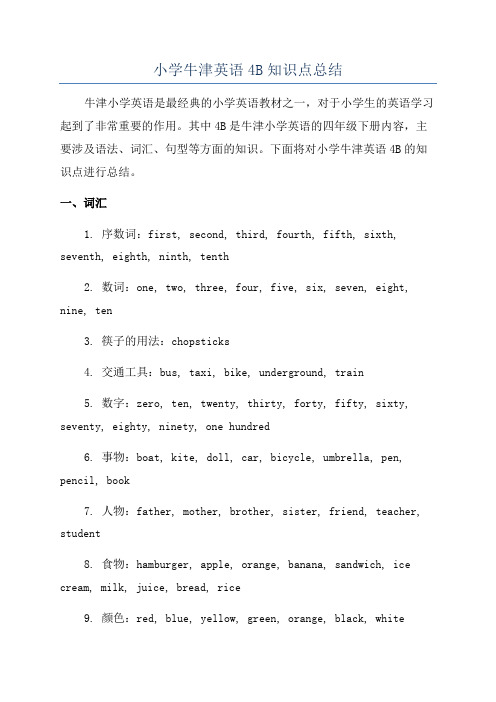
小学牛津英语4B知识点总结牛津小学英语是最经典的小学英语教材之一,对于小学生的英语学习起到了非常重要的作用。
其中4B是牛津小学英语的四年级下册内容,主要涉及语法、词汇、句型等方面的知识。
下面将对小学牛津英语4B的知识点进行总结。
一、词汇1. 序数词:first, second, third, fourth, fifth, sixth, seventh, eighth, ninth, tenth2. 数词:one, two, three, four, five, six, seven, eight, nine, ten3. 筷子的用法:chopsticks4. 交通工具:bus, taxi, bike, underground, train5. 数字:zero, ten, twenty, thirty, forty, fifty, sixty, seventy, eighty, ninety, one hundred6. 事物:boat, kite, doll, car, bicycle, umbrella, pen, pencil, book7. 人物:father, mother, brother, sister, friend, teacher, student8. 食物:hamburger, apple, orange, banana, sandwich, ice cream, milk, juice, bread, rice9. 颜色:red, blue, yellow, green, orange, black, white10. 音乐乐器:piano, violin, guitar, drums, flute11. 动物:dog, cat, monkey, panda, rabbit, bird, fish, elephant, tiger, lion12. 日期:Monday, Tuesday, Wednesday, Thursday, Friday, Saturday, Sunday二、语法1.一般现在时:主语+动词原形/第三人称单数现在时形式;e.g. I like music. He likes music.2. 物主代词:my, your, his, her, itse.g. This is my book.3.反意疑问句:陈述部分否定,疑问部分用否定的形式;陈述部分肯定,疑问部分用肯定的形式。
九年级上册英语第二单元4b知识点
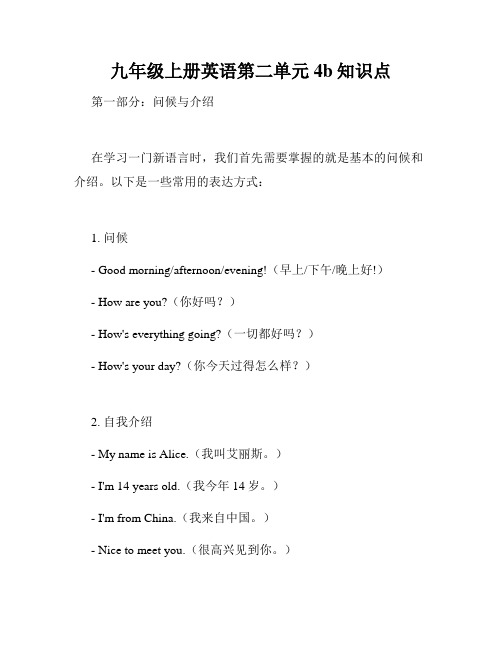
九年级上册英语第二单元4b知识点第一部分:问候与介绍在学习一门新语言时,我们首先需要掌握的就是基本的问候和介绍。
以下是一些常用的表达方式:1. 问候- Good morning/afternoon/evening!(早上/下午/晚上好!)- How are you?(你好吗?)- How's everything going?(一切都好吗?)- How's your day?(你今天过得怎么样?)2. 自我介绍- My name is Alice.(我叫艾丽斯。
)- I'm 14 years old.(我今年14岁。
)- I'm from China.(我来自中国。
)- Nice to meet you.(很高兴见到你。
)在日常生活中,学会用正确的方式进行问候和介绍,可以帮助我们与他人建立起良好的交流关系,增进了解。
第二部分:谈论爱好与兴趣在平时的交流中,谈论自己的爱好和兴趣是一个很常见的话题。
以下是几种常见的表达方式以及相关词汇:1. 询问爱好- What do you like doing in your free time?(你空闲时间喜欢做什么?)- Are you interested in playing football?(你对踢足球感兴趣吗?)- Do you have any hobbies?(你有什么爱好吗?)2. 回答爱好- I enjoy reading books.(我喜欢读书。
)- I love playing basketball.(我热爱打篮球。
)- My hobbies include painting and playing the piano.(我喜欢绘画和弹钢琴。
)3. 扩展话题- How often do you practice playing the piano?(你多久练习一次钢琴?)- Have you ever participated in any painting competitions?(你有参加过画画比赛吗?)通过与他人分享自己的爱好和兴趣,我们可以找到共同点,进一步加强彼此的交流和了解。
4B各单元知识点整理 (1)
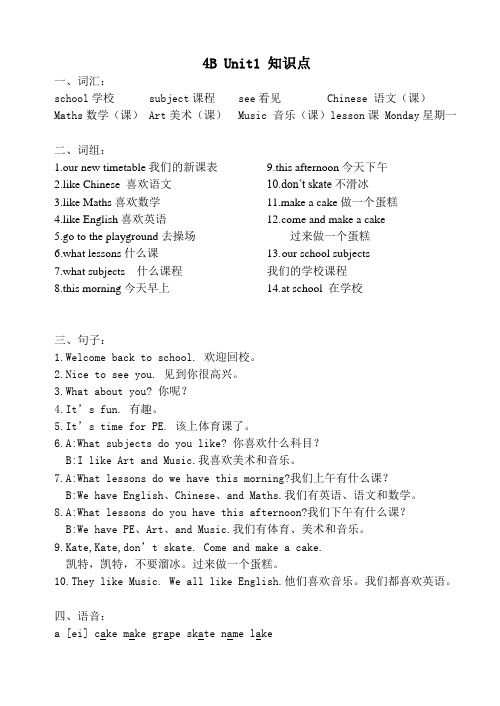
一、词汇:school学校 subject课程 see看见 Chinese 语文(课)Maths数学(课) Art美术(课) Music 音乐(课)lesson课 Monday星期一二、词组:1.our new timetable我们的新课表2.like Chinese 喜欢语文3.like Maths喜欢数学4.like English喜欢英语5.go to the playground去操场6.what lessons什么课7.what subjects什么课程8.this morning今天早上9.this afternoon今天下午10.don’t skate不滑冰11.make a cake做一个蛋糕e and make a cake过来做一个蛋糕13.o ur school subjects我们的学校课程14.at school 在学校三、句子:1.Welcome back to school. 欢迎回校。
2.Nice to see you. 见到你很高兴。
3.What about you? 你呢?4.It’s fun. 有趣。
5.It’s time for PE. 该上体育课了。
6.A:What subjects do you like? 你喜欢什么科目?B:I like Art and Music.我喜欢美术和音乐。
7.A:What lessons do we have this morning?我们上午有什么课?B:We have English、Chinese、and Maths.我们有英语、语文和数学。
8.A:What lessons do you have this afternoon?我们下午有什么课?B:We have PE、Art、and Music.我们有体育、美术和音乐。
9.Kate,Kate,don’t skate. Come and make a cake.凯特,凯特,不要溜冰。
[译林版]4B U1-U8核心知识整理(精华版)
![[译林版]4B U1-U8核心知识整理(精华版)](https://img.taocdn.com/s3/m/42d79d90dc3383c4bb4cf7ec4afe04a1b071b0a5.png)
[译林版]4B U1-U8核心知识整理(精华版)
本文档旨在为学生整理[译林版]4B U1-U8单元的核心知识,帮助学生快速回顾和复相关内容。
单元1:我们的家庭
- 介绍家庭成员的称谓和基本信息;
- 研究使用“有”和“没有”表达家庭成员的拥有情况;
- 研究描述家庭成员的特征和爱好。
单元2:我的学校
- 研究表达学校的位置和规模;
- 研究描述学校的设施和活动;
- 研究谈论学校的校规和研究情况。
单元3:旅游计划
- 研究询问和回答关于旅游计划的问题;
- 研究使用简单的方位词描述地点;
- 研究表达旅游活动的时间和方式。
单元4:我的周末
- 研究询问和回答关于周末活动的问题;- 研究使用时间状语表达周末活动的时间;- 研究描述周末活动的内容和感受。
单元5:食物与健康
- 研究谈论不同种类的食物;
- 研究表达食物的味道和口感;
- 研究描述健康饮食的重要性和好惯。
单元6:我的节日
- 研究介绍不同的节日和重要的庆祝活动;- 研究表达对节日的喜爱和参与;
- 研究分享自己的节日经历和感受。
单元7:小动物的世界
- 研究认识不同种类的小动物;
- 研究描述小动物的外貌和性;
- 研究表达对小动物的关心和保护。
单元8:我的英雄
- 研究介绍自己心目中的英雄;
- 研究描述英雄的特点和事迹;
- 研究表达对英雄的敬佩和感激。
以上是[译林版]4B U1-U8单元的核心知识概要,希望能对学生的复习和记忆提供帮助。
详细的单元内容和练习请参考教材。
4B U1-U8 知识点整理
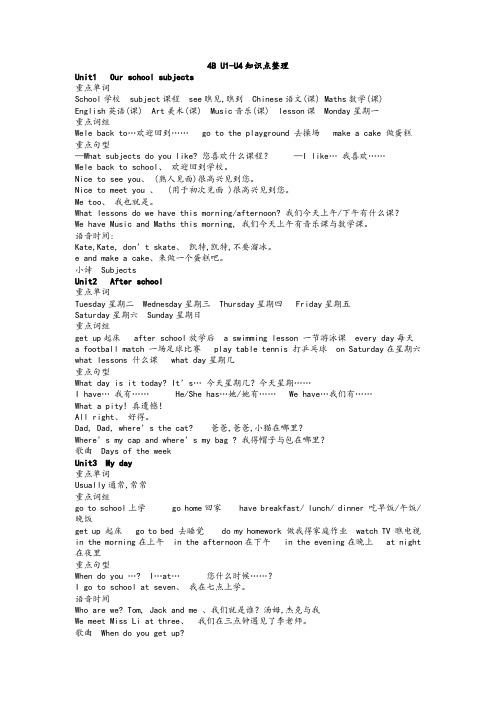
4B U1-U4知识点整理Unit1 Our school subjects重点单词School学校 subject课程 see瞧见,瞧到 Chinese语文(课) Maths数学(课) English英语(课) Art美术(课) Music音乐(课) lesson课 Monday星期一重点词组Wele back to…欢迎回到…… go to the playground 去操场 make a cake 做蛋糕重点句型—What subjects do you like? 您喜欢什么课程?—I like…我喜欢……Wele back to school、欢迎回到学校。
Nice to see you、 (熟人见面)很高兴见到您。
Nice to meet you 、 (用于初次见面 )很高兴见到您。
Me too、我也就是。
What lessons do we have this morning/afternoon? 我们今天上午/下午有什么课?We have Music and Maths this morning, 我们今天上午有音乐课与数学课。
语音时间:Kate,Kate, don’t skate、凯特,凯特,不要溜冰。
e and make a cake、来做一个蛋糕吧。
小诗 SubjectsUnit2 After school重点单词Tuesday星期二 Wednesday星期三 Thursday星期四 Friday星期五Saturday星期六 Sunday星期日重点词组get up起床 after school放学后 a swimming lesson 一节游泳课 every day每天a football match 一场足球比赛 play table tennis 打乒乓球 on Saturday在星期六what lessons 什么课 what day星期几重点句型What day is it today? It’s…今天星期几?今天星期……I have…我有…… He/She has…她/她有…… We have…我们有……What a pity! 真遗憾!All right、好得。
4B U1-U8 知识点整理

4B U1-U4知识点整理Unit1 Our school subjects重点单词School学校 subject课程 see看见,看到 Chinese语文(课) Maths数学(课)English英语(课) Art美术(课) Music音乐(课) lesson课 Monday星期一重点词组Welcome back to…欢迎回到…… go to the playground 去操场 make a cake 做蛋糕重点句型—What subjects do you like? 你喜欢什么课程?—I like…我喜欢……Welcome back to school. 欢迎回到学校。
Nice to see you. (熟人见面)很高兴见到你。
Nice to meet you . (用于初次见面 )很高兴见到你。
Me too. 我也是。
What lessons do we have this morning/afternoon? 我们今天上午/下午有什么课?We have Music and Maths this morning, 我们今天上午有音乐课和数学课。
语音时间:Kate,Kate, don’t skate. 凯特,凯特,不要溜冰。
Come and make a cake.来做一个蛋糕吧。
小诗 SubjectsUnit2 After school重点单词Tuesday星期二 Wednesday星期三 Thursday星期四 Friday星期五Saturday星期六 Sunday星期日重点词组get up起床 after school放学后 a swimming lesson 一节游泳课 every day每天a football match 一场足球比赛 play table tennis 打乒乓球 on Saturday在星期六what lessons 什么课 what day星期几重点句型What day is it today? It’s…今天星期几?今天星期……I have…我有…… He/She has…他/她有…… We have…我们有……What a pity! 真遗憾!All right. 好的。
4B英语复习知识点
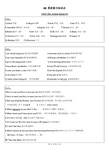
16.Monday星期一17.afternoon下午
词组:
1.our school subjects我们的学校课程2.welcome back to school欢迎回到学校
3.our new timetable我们的新课程表4.Chinese and Maths语文和数学
词组:(带*的表示知道意思,能看懂即可,有余力的可以写一写)
ually go to school at seven forty通常在7点40上学2.my day我的一天
3.have four lessons in the morning在上午有四节课4.in the afternoon在下午
3.We have English,Chinese...and Science.我们有英语课,语文课...以及科学课。
并列的词语:2个A and B 3个及以上A,B,C and D
4.Whatsubjectsdo you like? I like ...你喜欢什么课程?我喜欢...
5.What about you?=How about you?你呢?(用于补充提问,简单重复前一个问句)
4B英语复习知识点
Unit1 Our school subjects
单词:
1.school学校2.subject课程3.back背部;后面4.see看见,看到
5.timetable课程表;时间表6.English英语(课)7.Chinese语文(课)
8.Maths数学(课)9.Art美术(课)10.PE体育(课)11.Music音乐(课)
10.Tuesday星期二(TUE) 11.Thursday星期四(THUR) 12.Friday星期五(FRI) 13.when什么时候
[译林版]4B U1-U8知识要点总结(精简版)
![[译林版]4B U1-U8知识要点总结(精简版)](https://img.taocdn.com/s3/m/3fa5e39c0129bd64783e0912a216147917117ee4.png)
[译林版]4B U1-U8知识要点总结(精简版)本文档总结了[译林版]4B课本Unit 1到Unit 8的重点知识。
Unit 1: Our Hobbies- 研究了谈论兴趣爱好的表达方式,如“I like...”,“I don’t like...”等。
Unit 2: Meet My Family- 研究了介绍家庭成员的表达方式,如“Myfather/mother/brother/sister...”等。
Unit 3: How Do You Go to School?- 研究了交通工具的表达方式,如“by bus”,“by bike”等。
Unit 4: What's the Weather Like Today?- 研究了描述天气情况的表达方式,如“It's sunny”,“It's rainy”等。
Unit 5: What Would You Like for Breakfast?- 研究了点餐和描述食物的表达方式,如“I'd like...”,“It's delicious”等。
Unit 6: Where Are My Pencils?- 研究了描述物品位置的表达方式,如“on/in/under/behind...”等。
Unit 7: I Can Swim- 研究了谈论自己的能力的表达方式,如“I can swim”,“I can dance”等。
Unit 8: My Neighborhood- 研究了描述周围环境的表达方式,如“There is/are...”,“near/far from...”等。
以上是[译林版]4B课本Unit 1到Unit 8的重点知识总结。
总结内容简洁,概括了每个单元的核心内容,对学生复有很大帮助。
本文档是根据教材内容总结的,所有内容均为根据教材所做的概括,请确保与教材内容一致。
译林小学英语4B各单元重点词组和句子
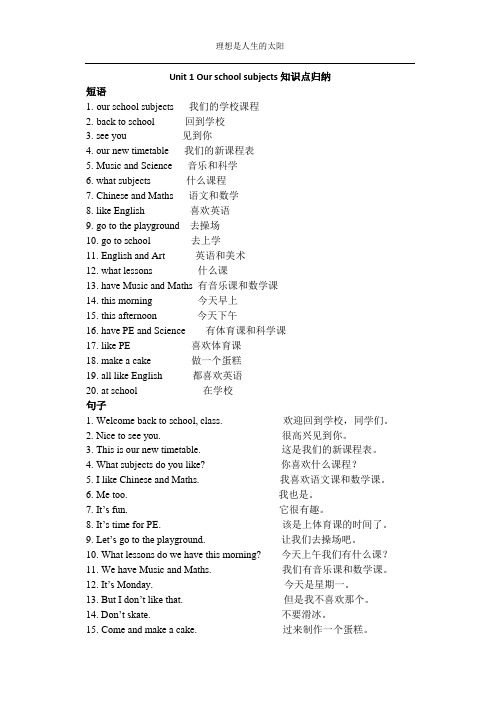
Unit 1 Our school subjects知识点归纳短语1.our school subjects 我们的学校课程2.back to school 回到学校3. see you 见到你4. our new timetable 我们的新课程表5. Music and Science 音乐和科学6. what subjects 什么课程7. Chinese and Maths 语文和数学8. like English 喜欢英语9. go to the playground 去操场10. go to school 去上学11. English and Art 英语和美术12. what lessons 什么课13. have Music and Maths 有音乐课和数学课14. this morning 今天早上15. this afternoon 今天下午16. have PE and Science 有体育课和科学课17. like PE 喜欢体育课18. make a cake 做一个蛋糕19. all like English 都喜欢英语20. at school 在学校句子1. Welcome back to school, class. 欢迎回到学校,同学们。
2. Nice to see you. 很高兴见到你。
3. This is our new timetable. 这是我们的新课程表。
4. What subjects do you like? 你喜欢什么课程?5. I like Chinese and Maths. 我喜欢语文课和数学课。
6. Me too. 我也是。
7. It’s fun. 它很有趣。
8. It’s time for PE. 该是上体育课的时间了。
9. Let’s go to the playground. 让我们去操场吧。
10. What lessons do we have this morning? 今天上午我们有什么课?11. We have Music and Maths. 我们有音乐课和数学课。
[译林版]4B U1-U8知识点整理(重点版)
![[译林版]4B U1-U8知识点整理(重点版)](https://img.taocdn.com/s3/m/f51df7bdbdeb19e8b8f67c1cfad6195f302be856.png)
[译林版]4B U1-U8知识点整理(重点版)本文档整理了[译林版]4B U1-U8的重要知识点,供参考使用。
课文内容
- U1: 我们的学校
- U2: 课外活动
- U3: 我的家乡
- U4: 四季之歌
- U5: 傣族风情
- U6: 盛夏的果实
- U7: 神奇的眼睛
- U8: 勇敢的小蓝鲸
语法要点
- 名词:单数形式和复数形式的变化规则
- 动词:一般现在时和过去式的构成
- 形容词:形容词的比较级和最高级的用法
- 介词:介词短语的基本用法和常见介词的搭配
- 状语从句:时间和原因状语从句的引导词和用法
- 特殊疑问句:有关人物、地点、时间、原因等的特殊疑问句的构成和回答方式
写作技巧
- 描写人物:使用形容词和具体的细节来描写人物形象
- 叙述事件:使用时间顺序词和过渡词来叙述事件的发展过程- 表达观点:使用连词和逻辑连接词来引导观点的表达和论述- 修辞手法:使用比喻、拟人、夸张等修辞手法增加文章的表现力
以上是[译林版]4B U1-U8知识点的整理,希望对你有所帮助。
如果需要更详细的内容,请参考教材或相关学习资料。
4B U1-U8 知识点整理
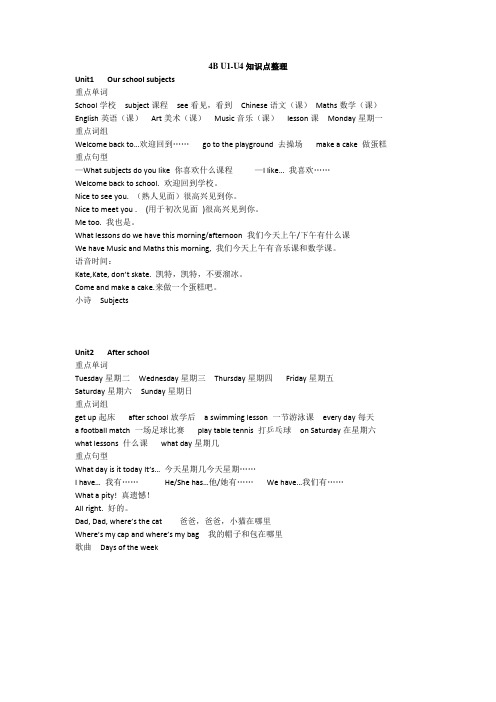
4B U1-U4知识点整理Unit1 Our school subjects重点单词School学校subject课程see看见,看到Chinese语文(课)Maths数学(课)English英语(课)Art美术(课)Music音乐(课)lesson课Monday星期一重点词组Welcome back to…欢迎回到……go to the playground 去操场make a cake 做蛋糕重点句型—What subjects do you like 你喜欢什么课程—I like…我喜欢……Welcome back to school. 欢迎回到学校。
Nice to see you. (熟人见面)很高兴见到你。
Nice to meet you . (用于初次见面)很高兴见到你。
Me too. 我也是。
What lessons do we have this morning/afternoon 我们今天上午/下午有什么课We have Music and Maths this morning, 我们今天上午有音乐课和数学课。
语音时间:Kate,Kate, don’t skate. 凯特,凯特,不要溜冰。
Come and make a cake.来做一个蛋糕吧。
小诗SubjectsUnit2 After school重点单词Tuesday星期二Wednesday星期三Thursday星期四Friday星期五Saturday星期六Sunday星期日重点词组get up起床after school放学后 a swimming lesson 一节游泳课every day每天a football match 一场足球比赛play table tennis 打乒乓球on Saturday在星期六what lessons 什么课what day星期几重点句型What day is it today It’s…今天星期几今天星期……I have…我有……He/She has…他/她有……We have…我们有……What a pity! 真遗憾!All right. 好的。
4BChapter2 Rules in fun places单元知识总结
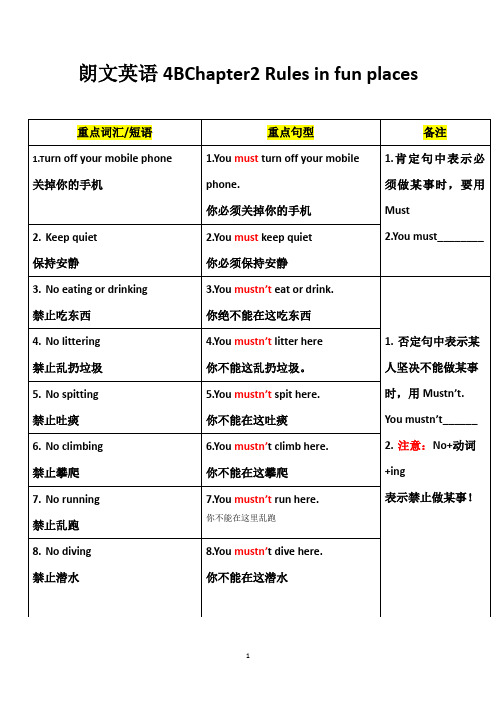
15.dangerous危险的
16.Spoil破坏,糟蹋
15.A:You mustn’t_________.
你不能........
B:Whymustn’t we__________?
我们为什么不........
A:Because it isdangerous.
因为很危险
Because itspoilshere.
你不能在这摘花。
13.Don’tswim in the river
禁止游泳
13.Youmustn’tswim in the river here.
你不能在这游泳。
14.Don’twrite on the rocks.
禁止在石头上乱写。
14.Youmustn’twrite on the rocks here.
7.No running
禁止乱跑
7.Youmustn’trun here.
你不能在这里乱跑
8.No diving
Байду номын сангаас禁止潜水
8.Youmustn’t dive here.
你不能在这潜水
9.Don’tlight fires
禁止放火
9.Youmustn’tlight fires here.
你不能在这放火
1.Don’t=Do not
后边记住要加动词原形。
2.我们使用Don’t ......
来写一些规则,条例。
3.注意区分No+动词+ing与Don’t+动词原形以及Must,Mustn’t之间的替换。
例如:
No littering=Don’t litter
=You mustn’t litter .
4B知识汇总
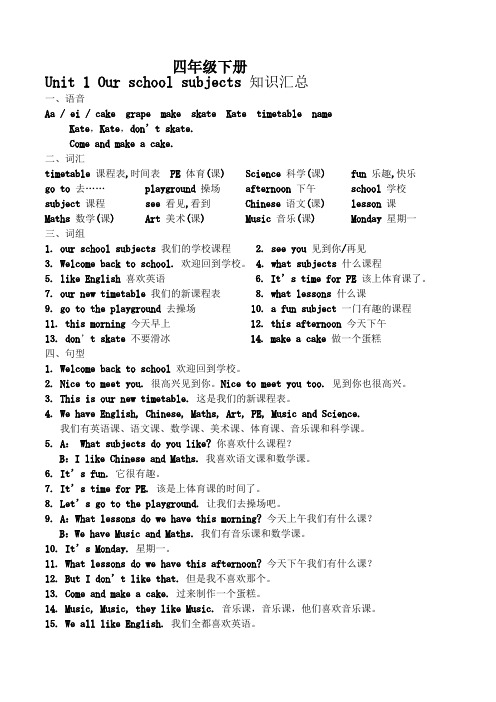
四年级下册Unit 1 Our school subjects 知识汇总一、语音Aa / ei / cake grape make skate Kate timetable nameKate,Kate,don’t skate.Come and make a cake.二、词汇timetable 课程表,时间表PE 体育(课) Science 科学(课) fun 乐趣,快乐go to 去……playground 操场afternoon 下午school 学校subject 课程see 看见,看到Chinese 语文(课) lesson 课Maths 数学(课) Art 美术(课) Music 音乐(课) Monday 星期一三、词组1. our school subjects 我们的学校课程2. see you 见到你/再见3. Welcome back to school. 欢迎回到学校。
4. what subjects 什么课程5. like English 喜欢英语6. It’s time for PE 该上体育课了。
7. our new timetable 我们的新课程表8. what lessons 什么课9. go to the playground 去操场10. a fun subject 一门有趣的课程11. this morning 今天早上12. this afternoon 今天下午13. don’t skate 不要滑冰14. make a cake 做一个蛋糕四、句型1. Welcome back to school 欢迎回到学校。
2. Nice to meet you. 很高兴见到你。
Nice to meet you too. 见到你也很高兴。
3. This is our new timetable. 这是我们的新课程表。
4. We have English, Chinese, Maths, Art, PE, Music and Science.我们有英语课、语文课、数学课、美术课、体育课、音乐课和科学课。
湘少版小学英语4B各单元知识点汇总

Unit 1 It is on your head!一、过关单词:cap(有帽檐的)帽子beside在……旁边between在……中间behind在……后面watch 手表answer 回答shoes鞋new新的glasses眼镜under 在……下面on 在……上面in在……里面二、过关句型:1.Where’s my new cap? 我的新帽子在那里?2.It is on your head. 在你的头上。
3.It is on the bed.在床上4.It is under the bed.在床下5.It is behind the door. 在门后面6.Where are my glasses? 我的眼镜在哪里?7.They are in your bag.在你的书包里。
8.They are beside the books.在你的书旁边。
9.They are between the caps.在帽子的中间。
三、过关知识点:1.区分介词:on(在...上面),in(在...里面),under(在...下面),behind(在...后面)beside(在...旁边)between(在...中间)2.区分where is ....? 和where are....? 及相应的回答。
注释:where is 表达单数概念,“一个... 在哪里?”,如:where is my blue shirt, Mum? (妈妈,我的蓝色衬衫在哪里?) 强调只有一件。
回答用:It is ... 如:It is on my head.(它在我头上。
)Where are 表达复数概念,“两个(以上)... 在哪里?”,如:where are my brown shoes, Mum?(妈妈,我的鞋子在哪里?) 鞋子有两只,强调两个(及以上)数量。
回答用:They are ... 如:They are under the chair.(它们在椅子下。
(完整word版)苏教版4BUnit1-8知识点整理

4B知识点总复习易错知识点:1. 介词at, in, on的用法at表示在“某时刻或某个时间点”,如at one o’clock at three fifteenin表示在“某段时间内”如:在早晨in the morning 在下午in the afternoon 在晚上in the evening,但是在夜里at night一年四季用介词in 如:in spring, in summeron表示“具体某一天、某天上午、下午或者晚上”如on Sunday, on my birthday, on Monday evening2. have表示“有”,有两种形式have和has。
前者用于第一人称(I,we),第二人称(you)和第三人称复数(they),后者用于第三人称单数(he,she,it,the boy,单个的人名)或在动词后加s,如:(1)She/He/David has a fever/has lunch.(2)She/He/David draws some pictures in the park.(3)He gets up at seven.3. 在can, can’t, want to, do,don’t, does,doesn't,let后面加动词原形。
如:(1)She/He/David can have lunch at twelve.(2)She/He/David wants to drink some juice.(3)Don’t swim in the river, it’s very dangerous.(危险的)(4 ) Let’s go to the playground.4. some一般用于肯定句和征求别人意见的疑问句中,如:(1)I can see some cakes on the table. 我在桌子上能看到一些蛋糕。
(2)Can I have some cakes? 我可以吃些蛋糕吗?(3)Would you like some cakes? 你想要些蛋糕吗?any一般用于疑问句和否定句中,如:(1)Do you have any cakes? 你有蛋糕吗?(2)Can you see any flowers under the tree ? 在树下你能看见花吗?(3)We don’t have any lessons on Saturday. 我们在周六没有课。
[译林版]4B Unit1-8单元知识点汇总
![[译林版]4B Unit1-8单元知识点汇总](https://img.taocdn.com/s3/m/d8e5f69b02d276a200292ef5.png)
四下Unit 1 单元知识1. school学校2. subject课程,科目3. see看见,看到4. C hinese语文(课)5. M aths 数学(课)6. A rt 美术(课)7. M usic音乐(课)8. lesson课9. M onday星期一10. Welcome back to…欢迎回到… 11. timetable课程表,时间表12. PE体育(课) 13. Science 科学(课) 14. fun乐趣,快乐15. go to 去…16. playground 操场17. afternoon 下午1. our school subject s我们的学校课程2. see you 见到你3. Chinese and Maths语文和数学4. like English 喜欢英语5. what subject s 什么课程(指学科)6. what lesson s什么课(指课)7. like English 喜欢英语8. Art and Music 美术和音乐9. have Music and Maths 有音乐课和数学课10. my school subject s我的学校课程11. back to school 回到学校12. our new timetable 我们的新课程表13. Music and Science 音乐和科学14. go to the playground 去操场15. this morning 今天早上16. this afternoon 今天下午17. like PE 喜欢体育课18. don’t like that 不喜欢那个19. don’t skate 不要滑冰20. make a cake 做一个蛋糕school 在学校22. Welcome back to... 欢迎回到...很高兴见到你。
Nice to meet you too. 见到你也很高兴。
4B unit4知识点
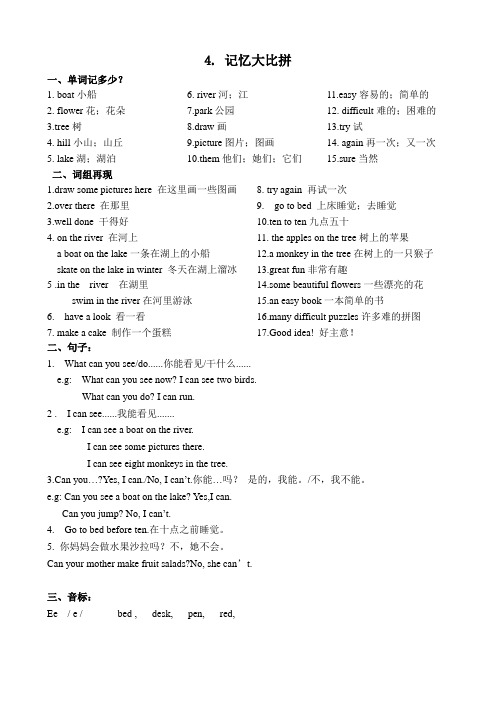
4. 记忆大比拼一、单词记多少?1. boat小船2. flower花;花朵3.tree树4. hill小山;山丘5. lake湖;湖泊6. river河;江7.park公园8.draw画9.picture图片;图画10.them他们;她们;它们11.easy容易的;简单的12. difficult难的;困难的13.try试14. again再一次;又一次15.sure当然二、词组再现1.draw some pictures here 在这里画一些图画2.over there 在那里3.well done 干得好4. on the river 在河上a boat on the lake一条在湖上的小船skate on the lake in winter 冬天在湖上溜冰5 .in the river 在湖里swim in the river在河里游泳6. have a look 看一看7. make a cake 制作一个蛋糕8. try again 再试一次9. go to bed 上床睡觉;去睡觉10.ten to ten九点五十11. the apples on the tree树上的苹果12.a monkey in the tree在树上的一只猴子13.great fun非常有趣14.some beautiful flowers一些漂亮的花15.an easy book一本简单的书16.many difficult puzzles许多难的拼图17.Good idea! 好主意!二、句子:1. What can you see/do......你能看见/干什么......e.g: What can you see now? I can see two birds.What can you do? I can run.2 . I can see......我能看见.......e.g: I can see a boat on the river.I can see some pictures there.I can see eight monkeys in the tree.3.Can you…?Yes, I can./No, I can’t.你能…吗?是的,我能。
- 1、下载文档前请自行甄别文档内容的完整性,平台不提供额外的编辑、内容补充、找答案等附加服务。
- 2、"仅部分预览"的文档,不可在线预览部分如存在完整性等问题,可反馈申请退款(可完整预览的文档不适用该条件!)。
- 3、如文档侵犯您的权益,请联系客服反馈,我们会尽快为您处理(人工客服工作时间:9:00-18:30)。
4B Unit1 A new student一、四会单词及词组1. student(学生)2. teacher(教师)3. doctor(医生)4. nurse(护士)5. boy(男孩)6. girl(女孩)7. man(男人)8. woman(女人)9. new(新的)10. come down (下来) 11. in the tree在树上(指外来物)12. on the tree 在树上(指树上长出来的)13. Let me see让我看看14. our(我们的)15. come down(下来)二.三会单词及词组1. excuse me(对不起,打扰一下)2. climb trees 爬树3. over there在那边4. listen to a Walkman 听随身听5. school(学校)6. welcome(欢迎)7. tree(树)8. climb(攀登)9. again(再;又)10. sir(先生)11. right(正确的)三、缩写词1. who’s = who is2. you’re = you are3. he’s = he is4. she’s = she is5. I’m = I am6. don’t = do not四、句型1. Who’s that boy?(那个男孩是谁?)He’s David.他是大卫。
He’s a student. 他是一位学生。
Who’s that woman?(那个妇女是谁?)She’s Miss Li. (她是李老师。
)She’s a teacher. (她是一位老师)2. Are you a nurse?(你是一位护士吗?)Yes, I am.(是,我是的。
)No, I’m not. I’m a doctor.(不,我不是的。
我是一位医生。
)3. Welcome to our school.(欢迎到我们学校来。
)Thank you.(谢谢。
)4. Don’t climb trees again.下次不要再爬树了。
5. Is he a teacher? 他是一位教师吗?No. He’s a doctor. 不,他是一位医生。
6. I’m new here.我是新来的。
Unit2 At a party一、四会单词及词组1. grandfather(祖父;外祖父)2. grandmother(祖母;外祖母)3. father(父亲)4. mother(母亲)5. brother(兄;弟)6. sister(姐;妹)7. white(白色的)8. friend(朋友)9. skirt(短裙) 10. party(宴会)11. with(有,具有…的特征)12. which(哪一个)13. big(大的)14. small(小的)15. long(长的)16. short(短的)17. at a party在聚会上18. be late for…迟到19.in穿戴(表示服饰)20.in the white skirt 穿着白色的短裙21. in the car在车里二.三会单词及词组1. hair(头发)2. head(头)3. nose(鼻子)4. mouth(嘴;口)5. eye(眼睛)6. ear(耳朵)7. we(我们) 8. Let’s hurry.让我们快点。
9. hurry(赶快)10. wrong(错误的)三、缩写词1. we’re = we are2. isn’t = is not3. it’s = it is4. let’s = let us5. where’s = where is四、句型1. Who’s the boy with big eyes ?(那个大眼睛的男孩是谁?)He’s my brother.他是我的哥哥)2. Is that girl your sister? (那个女孩是你妹妹吗?)Which one?(哪一个?)The one in the white skirt.(那个穿着白色短裙的。
)Yes, she is.(是,她是的。
)3. Good evening.晚上好4. Nice to meet you. 见到你很高兴。
5. This is my friend, Mike.这是我的朋友,迈克。
6. We’re late for the party. 我们去参加聚会要迟到了。
我用am,你用are,is用于他,她,它。
单数、不可数用is,复数名词全用are.Unit3 What’s your job?一、四会单词及词组1. a policeman (policemen)(警察)2. a policewoman (policewomen)(女警察)3. a waiter (waiters)(男服务员)4. a waitress (waitresses)(女服务员)5. a driver (drivers)(司机)6. a worker (workers)(工人)7. a cook (cooks)(厨师) 8. a farmer (farmers)(农民)9. job(职业)10. name(名字)11. their(他(她/它)们的)12. how old(几岁)13. how many(多少)14. look at(看)15. that old woman 那个老年妇女16. about sixty大约六十岁二、三会单词及词组1. today(今天)2. old(老的)3. about(大约)4. want(想要)5. cold(冷的)二、缩写词1. aren’t = are not2. what’s = what is3. they’re = they are三、句型1. What’s your job?(你的职业是什么?)I’m a student(我是一位学生)What’s his job?(他的职业是什么?)He’s a driver。
(他是一位司机)What’s her job?(她的职业是什么?)She’s a waitress。
(她是一位女服务员)2. What are their jobs?(他/她们的职业是什么?)They’re farmers.(他/她们是农民)3. Are they waiters?(他们是男服务员吗?)Yes, they are.(是,他们是的。
)No, they aren’t. They’re cooks.(不,他们不是的。
他们是厨师)4. How old are you?(你几岁了?)I’m eleven.(我11岁。
)How old is he?(他几岁了?)He’s twenty.(他20岁。
)How old is she?(她几岁了?)She’s eighty。
(她80岁。
)5. What’s your name?(你叫什么名字?)I’m Jack.(我是杰克。
)What’s his name?他叫什么名字?He’s Ben. 他是本。
What’s her name? 她叫什么名字?She’s Mingming. 她叫明明。
6. What do you want to be? 你以后想要成为什么?I want to be a doctor. 我想要成为一名医生。
7. How many boys and girls want to be a teacher? 有多少个男孩和女孩想要成为老师呢?8. It’s cold today, isn’t it? 今天很冷,不是吗?Unit4 Buying fruit一、四会单词及词组1. an apple (apples)(苹果)2. an orange (oranges)(桔子)3. a banana (bananas)(香蕉)4. a peach (peaches)(桃子)5. a grape (grapes)(葡萄)6. a pineapple (pineapples)(菠萝)7. a watermelon (watermelons)(西瓜)8. a pear (pears)(梨子)9. buy(买) 10. I like 我喜欢11. I’d like 我想要12. these or those?这些还是那些?13. buy fruit买水果二.三会单词及词组1. or(或者)2. yuan(元)3.great(好极了)4. some(一些)5. fruit(水果)6. kilo(公斤)三、缩写词I’d = I would四、句型1. What are these?(这些是什么?)They’re pears.(它们是梨子。
) What are those?(那些是什么?)They’re grapes.(它们是葡萄。
)2. Can I help you? 我能为您效劳吗?I’d like some peaches, please.(我想要一些桃子。
)How many kilos?(多少公斤?)One kilo, please.(请来1公斤。
)Here are you.(给你。
)3. Are they peaches? 它们是桃子吗?Yes, they are. 是的,它们是。
Unit6 Let’s go by taxi一、单词及词组1. station(车站)2. supermarket(超级市场)3. library(图书馆)4. theatre(剧场)5. hospital(医院)6. airport(机场)7. by【表示交通等的方式】乘8. taxi 出租车9. on foot(步行)10. how(怎么)11. there(在那里)12. for(往;向)13. free(空闲的)14. park(公园)二.三会单词及词组1. by train(乘火车)2. by plane(乘飞机)3. by minibus(乘中客车)4. by taxi(乘公共汽车)5. play(玩;参加)6. football(足球)7. ball(球)8. Good idea.(好主意。
)三、句型1. Let’s go to the theatre. 让我们一起去剧院吧。
Good.好的。
Great.(太棒了。
)How do we go there?(我们怎么去那里啊?)Shall we go to the hospital by taxi? 我们乘出租车去医院,好吗?OK. /All right.(好的)2. Is this bus for the theatre?(这辆公共汽车是去剧院的吗?)Yes, it is.(是,它是的。
)No, it isn’t.(不,它不是的。
